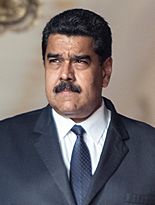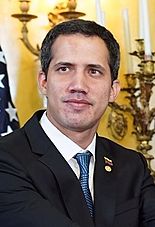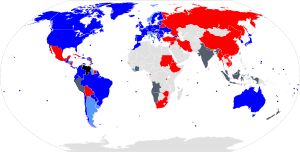2019 Venezuelan Presidential crisis facts for kids
Quick facts for kids 2019 Venezuelan Presidential crisis |
|||||
|---|---|---|---|---|---|
| Part of Crisis in Venezuela | |||||
|
|||||
| Commanders and leaders | |||||
 |
 |
||||
| Strength | |||||
|
Internal bodies |
Internal bodies: |
||||
Since early January 2019, the country of Venezuela has been facing a big problem with its leadership. This situation is called a "Presidential crisis." It means there is a lot of confusion about who is the true and legal President.
This crisis started when Nicolás Maduro began his second term as president. Many people and countries believed his election was not fair. They thought he should have stepped down on January 10, 2019.
When Maduro took office again, many countries spoke out against it. Venezuela's National Assembly, which is like its parliament, declared an emergency. Some nations even closed their embassies in Venezuela. They said that Maduro was turning Venezuela into a dictatorship, meaning he was ruling without proper legal power.

Contents
Who are the Main Leaders?
The two main people involved in this crisis are Nicolás Maduro and Juan Guaidó. They both claim to be the rightful leader of Venezuela.
Nicolás Maduro's Role
Nicolás Maduro was first elected president in 2013. He was re-elected in 2018. However, many countries and groups said this election was not fair. They believed it did not follow democratic rules.
Maduro's government says that the current crisis is a "coup d'état." They believe it is a plan led by the United States. They say the goal is to remove Maduro from power. They also claim it is to gain control over Venezuela's large oil reserves.
Juan Guaidó's Role
Juan Guaidó became the head of Venezuela's National Assembly on January 5, 2019. He quickly started working to create a "transitional government." This is a temporary government meant to lead the country until a new, fair election can be held.
Guaidó and the National Assembly said that Maduro was not the legal president. They declared that Venezuela was in a state of emergency. Guaidó then claimed he was the acting president. He said this was allowed by Venezuela's constitution because the country had no legitimate leader.
Why is There a Disagreement?
The main disagreement is about whether Nicolás Maduro's 2018 election was legal.
- Maduro's supporters say he won the election fairly. They believe he is the legitimate president.
- Guaidó and his supporters say the election was rigged. They believe Maduro is ruling like a dictator. They want new, fair elections.
This disagreement has led to a split in the country. Some parts of the government support Maduro. Other parts, like the National Assembly, support Guaidó.
What Do Different Countries Say?
Countries around the world have taken different sides in this crisis.
- Many countries, including the United States and most of Latin America, recognize Juan Guaidó as Venezuela's acting president. They believe his claim is based on the constitution.
- Other countries, like Russia, China, and Cuba, continue to support Nicolás Maduro. They see him as the legal president.
- Some countries have remained neutral, meaning they do not openly support either side.
This difference in opinion among countries shows how complex the situation is.
Images for kids
-
Presidents of Cuba, Bolivia and El Salvador greet Maduro at Maduro's second inauguration on 10 January 2019
-
Mike Pence meets with Carlos Vecchio, Julio Borges, and other Washington-based Venezuelan representatives on 29 January 2019
-
Guri Dam supplies 80% of Venezuela's electrical power.
-
U.S. Assistant Secretary of State Kimberly Breier, Juan Guaidó's wife Fabiana Rosales, U.S. Special Representative for Venezuela Elliott Abrams, and Venezuelan Ambassador to the U.S. Carlos Vecchio, and diplomat in Washington, D.C. on 27 March 2019
-
Juan Guaidó speaks to supporters on 30 April 2019
-
On 18 February 2019, President Donald Trump advised Venezuelan soldiers to renounce loyalty to Nicolás Maduro.
-
Univision anchor Jorge Ramos was detained by the Maduro administration in February 2019 after a live interview.
See also
 In Spanish: Crisis presidencial de Venezuela para niños
In Spanish: Crisis presidencial de Venezuela para niños
 | Laphonza Butler |
 | Daisy Bates |
 | Elizabeth Piper Ensley |











